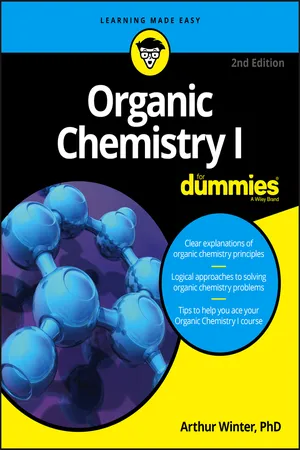
- English
- ePUB (mobile friendly)
- Available on iOS & Android
Organic Chemistry I For Dummies
About this book
Organic Chemistry I For Dummies, 2nd Edition (9781119293378) was previously published as Organic Chemistry I For Dummies, 2nd Edition (9781118828076). While this version features a new Dummies cover and design, the content is the same as the prior release and should not be considered a new or updated product.
The easy way to take the confusion out of organic chemistry
Organic chemistry has a long-standing reputation as a difficult course. Organic Chemistry I For Dummies takes a simple approach to the topic, allowing you to grasp concepts at your own pace.
This fun, easy-to-understand guide explains the basic principles of organic chemistry in simple terms, providing insight into the language of organic chemists, the major classes of compounds, and top trouble spots. You'll also get the nuts and bolts of tackling organic chemistry problems, from knowing where to start to spotting sneaky tricks that professors like to incorporate.
- Refreshed example equations
- New explanations and practical examples that reflect today's teaching methods
- Fully worked-out organic chemistry problems
Baffled by benzines? Confused by carboxylic acids? Here's the help you need—in plain English!
Frequently asked questions
- Essential is ideal for learners and professionals who enjoy exploring a wide range of subjects. Access the Essential Library with 800,000+ trusted titles and best-sellers across business, personal growth, and the humanities. Includes unlimited reading time and Standard Read Aloud voice.
- Complete: Perfect for advanced learners and researchers needing full, unrestricted access. Unlock 1.4M+ books across hundreds of subjects, including academic and specialized titles. The Complete Plan also includes advanced features like Premium Read Aloud and Research Assistant.
Please note we cannot support devices running on iOS 13 and Android 7 or earlier. Learn more about using the app.
Information
Getting Started with Organic Chemistry
The Wonderful World of Organic Chemistry
Shaking Hands with Organic Chemistry
What Are Organic Molecules, Exactly?
Table of contents
- Cover
- Table of Contents
- Introduction
- Part 1: Getting Started with Organic Chemistry
- Part 2: Hydrocarbons
- Part 3: Functional Groups
- Part 4: Spectroscopy and Structure Determination
- Part 5: The Part of Tens
- Part 6: Appendixes
- About the Author
- Advertisement Page
- Connect with Dummies
- End User License Agreement
